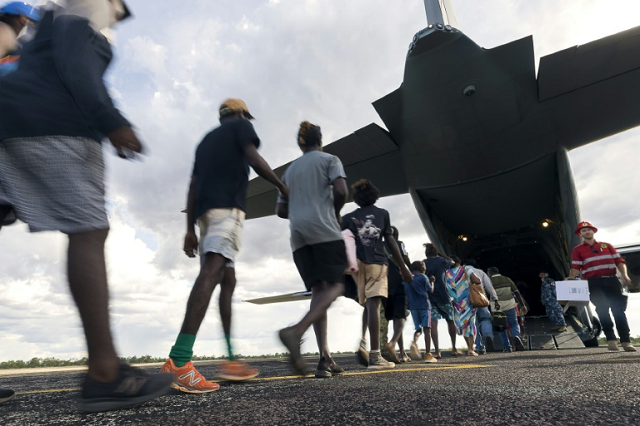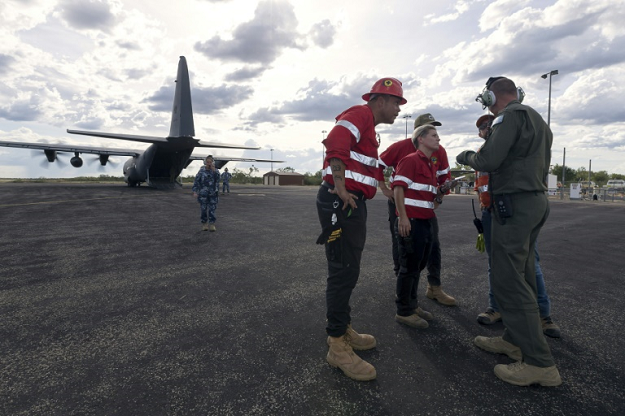Twin cyclones batter Australia
No immediate reports of deaths or injuries

Residents of McArthur River, a remote town in the Northern Territory, boarding an Australian military plane as authorities evacuate communities in the path of a powerful cyclone. PHOTO: AFP
Cyclone Trevor, pushing a big storm tide and packing winds of up to 250 kilometres per hour (150 mph), made landfall on the sparsely populated Northern Territory coast near the Gulf of Carpentaria town of Port McArthur, the Bureau of Meteorology reported.
The storm was downgraded to a category 3 shortly after making landfall, and was expected to weaken further as it travelled inland, though officials warned of heavy rains and flooding.
At least 23 dead in Alabama tornado, toll expected to rise
"There's a concern that flash flooding may occur," said emergency operations official Michael Hebb
The army and police had already evacuated most residents from outposts in Trevor's path, many of them indigenous communities, though a handful of locals remained behind, police said.
There were no immediate reports of deaths or injuries from the storm, but evacuated residents feared what they might find when they return home.
"We are only new to the area and the house we are in isn't going to sustain the expected winds that are predicted," said Port McArthur resident Emily Crawford, who evacuated to the regional capital, Darwin.
 Even though the military evacuated most of the communities in the path of the cyclone, a handful of residents stayed behind. PHOTO: AFP
Even though the military evacuated most of the communities in the path of the cyclone, a handful of residents stayed behind. PHOTO: AFP"This is the scariest thing I've ever been through, I've never lived through even a flooding event, let alone a cyclone of this nature, I hope all my friends and neighbours are safe," she told AFP.
The Bureau of Meteorology (BOM) said Trevor was driving a "very dangerous storm tide" along coastal regions and that heavy rainfall was expected to cause flooding across wide areas of the Northern Territory and neighbouring Queensland.
Meanwhile another category 4 cyclone, Veronica, was bearing down on the more heavily populated mining region of Pilbara in Western Australia state, where it was expected to make landfall late on Saturday or Sunday.
Death toll in Cuba tornado rises to six
A spokesperson for the Western Australia branch of the BOM said Veronica was expected to slow down as it approached the coast near the mining centre of Port Hedland with the "potential for a very dangerous storm surge" at a time when tides are already near their high for the year.
He said the region, one of Australia's main mining areas, would experience 12 hours or more of "very destructive winds" and the possibility of "significant coastal inundation".
Australia's western coast usually sees three or four cyclones per year and emergency services said residents were well-prepared for the storm.






1726734110-0/BeFunky-collage-(10)1726734110-0-208x130.webp)












COMMENTS
Comments are moderated and generally will be posted if they are on-topic and not abusive.
For more information, please see our Comments FAQ